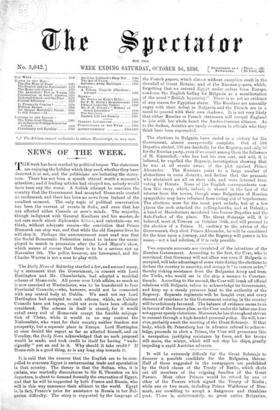Two separate accounts are circulated of the intentions of the
Russian Government. According to the first, the Czar, who is convinced that Germany will not allow war even if Bulgaria is occupied, will take advantage of some riots during the elections to declare the country in anarchy, and occupy it "to restore order," thereby risking resistance from the Bulgarian Army and from the Turks, who would see in the step a menace to Constan- tinople. According to the second, the Czar will break off official relations with Bulgaria, refuse to acknowledge its Government, and keep up a steady pressure fatal to the authority of the Regency. Separate regiments will be bought over, and every element of resistance to the Government existing in the country will be sedulously favoured. The balance of evidence seems to us in favour of the former plan, as the Czar under the latter one does not appear openly victorious. Moreover,he has throughout striven to succeed through a high-handed personal policy. He will, how- ever, probably await the meeting of the Great Sobranje. If that body, which St. Petersburg has in advance refused to acknow- ledge, proceeds to elect a Prince, the Czar will pronounce this a usurpation justifying resistance by force, and his troops will move, the winter, which will not stop his ships, greatly impeding a rapid Austrian advance.


































